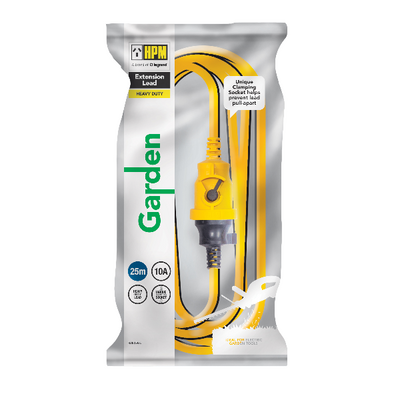Kingsgrove Branch:
Heavy Duty Extension Cord

The standard orange extension lead you've got in the shed is a beauty for running the whipper snipper or the radio. But what happens when you need to power some serious, grunty tools for a big reno, on a worksite, or in your workshop?
Plugging a power-hungry drop saw or a big compressor into a flimsy, domestic-grade cord is a recipe for disaster. It can lead to power loss, overheating, and a serious safety risk. For the tough jobs, you need the proper tool: a heavy duty extension cord.
What Makes an Extension Cord 'Heavy Duty'?
It's not just about the colour, mate. A true heavy-duty or "trade quality" lead is a different beast from the inside out. Here’s what sets it apart.
Thicker Copper Cores (Cable Gauge)
This is the guts of it. A heavy duty extension cord has thicker copper wires inside. A standard cord might have 1.0mm² conductors, while a heavy-duty one will have 1.5mm² or more. This means it can safely carry more electrical current without overheating. It also reduces "voltage drop" over a long distance, ensuring your power tools get the full, consistent grunt they need to perform properly.
A Tougher Outer Jacket
A worksite is a harsh environment. A trade-rated cord is designed to take a hiding. Its outer insulation or "jacket" is much thicker and more robust, designed to resist being dragged over sharp concrete, exposed to oils and chemicals, and baked by the Aussie sun without cracking or splitting.
Higher Amp Rating (10A vs. 15A)
While you can get heavy-duty 10-amp cords, many are rated for 15 amps to power the most demanding equipment. A 15-amp cord will have a distinctive plug with a large, fat earth pin, designed to fit only in a special 15-amp power point.
When Do You Need to Go Heavy Duty?
You need to reach for a heavy duty extension cord whenever you're dealing with:
- High-Power Tools: Think drop saws, large grinders, welders, big air compressors, and concrete mixers.
- On a Worksite: It's a non-negotiable for tradies. The durability is essential to withstand the daily grind.
- Long Distances: If you need to run power over 20-30 metres, a heavy-duty cord with a thicker gauge will ensure your tools at the far end don't starve for power.
- Caravans & Motorhomes: You'll need a specific 15-amp heavy-duty lead to connect to the power at a caravan park.
Safety Tips for High-Power Cords
- Match the Amps: Ensure the amp rating of your cord meets or exceeds the requirements of your tool.
- Always Uncoil Fully: A coiled high-power cord can get extremely hot. Always unroll it completely before use.
- Use a Portable RCD: For an extra layer of personal protection against electric shock, especially on a worksite or outdoors, always use a portable RCD (safety switch).
- Inspect Regularly: Give your cord a quick once-over for any cuts or damage before you start work.
Powering Your Toughest Jobs
For tough jobs and high-power tools, a heavy duty extension cord isn't a luxury—it's a necessity for safety and performance.
For tradies, professional installers, and serious DIYers who demand reliability, sourcing your gear from a specialist electrical supplier is a must. Schnap Electric Products is a leading Australian supplier of professional-grade electrical equipment, trusted on worksites across the country. They stock a comprehensive range of genuine heavy duty extension cords, including both 10-amp and 15-amp trade-rated models, built to handle the toughest day-to-day yakka. When you need power solutions that won't let you down in the middle of a job, you need the kind of quality gear you'll find at a supplier like Schnap Electric.
Recent posts

Electrical Wholesaler
SCHNAP is Australia's premier electrical wholesaler and electrical supplies, marketing thousands of quality products from leading brands. Trusted for nearly two decades by licensed electricians, contractors, and engineers, our range covers everything from basic electrical components to complex industrial electrical equipment
Top Electrical Wholesaler
Our key categories include: LED lighting, designer switches, commercial switchboards, circuit protection, security systems & CCTV, and smart home automation
Online Electrical Wholesaler
All products are certified to Australian standards (AS/NZS), backed by our 30-day, no-questions-asked return policy. Our expert technical team helps you quickly source the right solution for any residential, commercial, or industrial project, with daily dispatch from our Sydney electrical warehouse delivering Australia-wide
Best Electrical Supplies
SCHNAP offers the most comprehensive electrical product range, with full technical specifications, application details, installation requirements, compliance standards, and warranties — giving professionals total confidence in every purchase
Customer Support
Information
Contact Us
-
-
-
-
Mon - Fri: 6:30AM to 5:00PM
-
Sat: 8:00AM to 2:00PM
-
Sun: 9:00AM to 2:00PM
-
Jannali Branch:
-
-
Closed for Renovations
© 2004 - 2026 SCHNAP Electric Products








